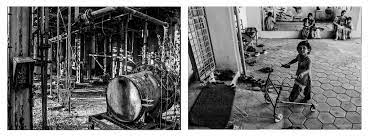On the 40th anniversary of the Bhopal gas tragedy, United Nations experts have emphasized that the catastrophic industrial disaster and its aftermath remain a pressing concern, with hazardous waste still endangering hundreds of thousands in and around the city. They called for immediate action to address contamination, provide adequate compensation, and ensure corporate accountability.
On the night of December 2, 1984, 27 metric tonnes of methyl isocyanate gas leaked from Union Carbide Corporation's pesticide plant in Bhopal, India. The incident exposed over 570,000 people to toxic chemicals, claiming more than 10,000 lives within three days and resulting in over 22,000 additional deaths since. Chronic illnesses, adverse reproductive outcomes, and genetic damage among survivors continue to plague the community.
The contamination of soil and drinking water in 71 villages in Madhya Pradesh has affected an estimated 200,000 people, creating what experts have termed a "sacrifice zone." Women have borne the brunt, with significant increases in infertility, miscarriages, and congenital disabilities in children born to exposed families.
Insufficient Compensation and Medical Support
Victims have struggled to access adequate remedies:
Compensation Shortcomings: Mechanisms for disbursing compensation have failed to meet the needs of those affected, contravening the UN Guiding Principles on Business and Human Rights.
Medical Care Gaps: Government-provided health services have been insufficient to address the long-term health crises stemming from the disaster.
Suppression of Protests: Survivors advocating for justice have faced repression, further compounding their plight.
Corporate and Governmental Accountability
The Union Carbide Corporation (UCC), now owned by Dow Chemical, has evaded accountability for the disaster. Despite compelling evidence of UCC’s direct involvement in managing and overseeing operations in Bhopal, the US government has failed to cooperate fully with Indian judicial efforts. American courts have denied justice to the victims, while the contaminated site remains untreated.
“Multinational corporations applying lower safety standards in their operations abroad continue to transfer risks to Global South countries, as exemplified by the Bhopal tragedy,” the experts stated.
Global Lessons and Calls to Action
The tragedy underscores the dangers of transferring hazardous technologies to countries with less stringent safety regulations and highlights the need for corporate responsibility in addressing industrial risks. UN experts have urged:
Clean-Up and Remediation: Immediate action to decontaminate affected areas and prevent further environmental harm.
Adequate Compensation: A reassessment of compensation mechanisms to ensure survivors receive the reparations they deserve.
Corporate Accountability: Dow Chemical must take responsibility for UCC's actions and contribute to remediation efforts.
International Cooperation: Governments of India and the United States must ensure judicial cooperation and uphold the rights of victims.
A Call for Justice and Renewal
"Four decades later, the ongoing suffering of the people of Bhopal is a stark reminder of the consequences of unchecked industrial practices and weak corporate oversight," the UN experts concluded. They called on stakeholders to work collectively to rectify the injustice and provide victims with the clean, sustainable environment and support they are entitled to.
Background:The Bhopal disaster remains one of the world's worst industrial chemical incidents. Activists, survivors, and international observers continue to demand justice for the victims and lessons to prevent future tragedies of this scale.

